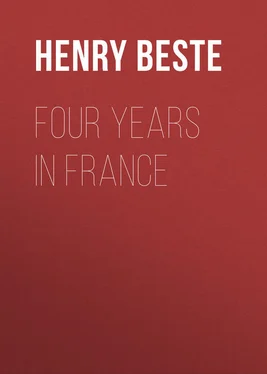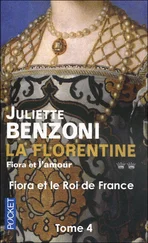Henry Beste - Four Years in France
Здесь есть возможность читать онлайн «Henry Beste - Four Years in France» — ознакомительный отрывок электронной книги совершенно бесплатно, а после прочтения отрывка купить полную версию. В некоторых случаях можно слушать аудио, скачать через торрент в формате fb2 и присутствует краткое содержание. Жанр: foreign_antique, foreign_prose, Путешествия и география, на английском языке. Описание произведения, (предисловие) а так же отзывы посетителей доступны на портале библиотеки ЛибКат.
- Название:Four Years in France
- Автор:
- Жанр:
- Год:неизвестен
- ISBN:нет данных
- Рейтинг книги:4 / 5. Голосов: 1
-
Избранное:Добавить в избранное
- Отзывы:
-
Ваша оценка:
- 80
- 1
- 2
- 3
- 4
- 5
Four Years in France: краткое содержание, описание и аннотация
Предлагаем к чтению аннотацию, описание, краткое содержание или предисловие (зависит от того, что написал сам автор книги «Four Years in France»). Если вы не нашли необходимую информацию о книге — напишите в комментариях, мы постараемся отыскать её.
Four Years in France — читать онлайн ознакомительный отрывок
Ниже представлен текст книги, разбитый по страницам. Система сохранения места последней прочитанной страницы, позволяет с удобством читать онлайн бесплатно книгу «Four Years in France», без необходимости каждый раз заново искать на чём Вы остановились. Поставьте закладку, и сможете в любой момент перейти на страницу, на которой закончили чтение.
Интервал:
Закладка:
The emigrant was M. l'Abbé Beaumont, who had formerly been rector of the university of Caën, and appointed canon of the cathedral of Rouen: he was about to take possession of his stall, when the order was issued, on account of the approach of the Duke of Brunswick, that every priest who should still refuse to take the oath prescribed by the civil constitution of the clergy, should be banished from France within fifteen days. He had been brought to Lincoln by a gentleman of the neighbourhood, who had retained him for some time in his family to teach French to his children. On the death of Mr. Knight, whom I have mentioned above, he was appointed to the care of the little catholic congregation of Lincoln. When visiting at my mother's house, I had formerly known him; and, on this occasion, renewed my acquaintance with him.
After the Anglican had taken his leave, he talked for some time on indifferent topics, but at length renewed the former conversation with an air, as if he had recollected something, though I rather suspect he had prepared himself. "Pray, at what time did the change take place from your doctrine, respecting the Eucharist, to that professed by all Christians three hundred years ago?" I begged of him to put his question more clearly. "If your doctrine on this point be the true one, it was taught by the apostles, and received by the first Christians; then, our interpretation must have been introduced at some subsequent period: I ask you to fix that period." There were better reasons than I at the time supposed for my inability to give a precise answer. "It was introduced gradually during the dark ages." – "In the first place, gradually – that is impossible: the question is, whether the body of Christ is really or figuratively present: the people must have known in which sense they believed it to be present, and would have resisted innovation. Do you think it would be easy at this day to make the people of England believe in the real presence?" – "No; because they have already rejected it." – "I admit the difference; but at any time it must have been impossible to change the faith of the people without their perceiving it; and the controversy, which the attempt must have excited, would have come down to our days in works written on both sides: the memory of the Arian controversy is not lost." I was struck by the argument and the parallel. He pressed me. "What do you call the dark ages?" – "The tenth century is called by Cave, a learned English divine, seculum tenebrosum ." – "Berenger of Angers, in the eleventh century, who first taught the figurative sense, found all the world in the belief of the real presence." – "First? you forget the apostles." – "It is for you to prove that they taught the figurative sense. St. John Chrysostom, who lived in the fourth age, preached on this subject like a catholic doctor of the present day." – "Really? I have his works; I will refer to the passages." – "Will you give me leave to send you a treatise on this subject, entitled La perpétuité de la foi de l'église touchant l'eucharistie ?" As I was going to convert the Jews by a Bampton lecture, I said I did not wish to engage in reading a great work in old French: I inferred that it was old French from the word touchant . Mr. Beaumont assured me that it was written in very good French of the present time, as also in a very agreeable style: he told me, that at any rate I should have time to read the tract of Nicole, of a few pages only, stating the argument; that if I did not approve of it, I need not read the Perpétuité by Arnaud, which was the development of Nicole's text. I assented, and he wished me a good evening.
I immediately referred to my edition of Chrysostom, by Sir Henry Savile, in eight volumes folio, – a master-piece of Greek typography, which I had bought for three shillings a volume. I had read at hazard some of the homilies. As these are in the form of a running commentary on the gospels and epistles, it was easy for me to turn to the texts in which the institution of the Lord's Supper is narrated, and to the Epistle to the Corinthians in which it is spoken of. I have no means at present of making quotations; those who are so inclined may refer as I did. I showed these passages afterwards to two protestant friends, who affirmed, "they must be figurative, because they were so strong for the literal meaning." Sacramentarians are obliged to treat in this way the words of Christ himself: this mode of begging the question (for it is nothing else) showed me the advantage of another sort of argument, which I found in Nicole and Arnaud.
They take it for granted that if it were certain Christ meant the words, "this is my body," in the literal sense, protestants would give up the cause. In the time of these writers it might be so: I would not be too sure of that in the present day: I think many would reject, perhaps have already rejected, the divinity of Christ, and his authority to teach such a doctrine, rather than admit the doctrine itself. I, however, was not thus daring: I was prepared to admit the conclusion, if the premises were proved. Unbelievers and catholics are consistent: protestants are philosophers by halves.
The apostles then, according to Nicole, understood in what sense Christ spoke the words, "this is my body," &c. and taught that sense to the first Christians, and the same sense was delivered to succeeding ages. But, if this were the figurative sense, all the Christian world must, at some time, have gone to sleep in the belief of the figurative sense, and awaked in the belief of the literal. The change, if there was one, was effected without the least disturbance, nobody knows how; and this, not in a question of abstract doctrine, but in one which included the adoration of latria , or the divine honour paid to the consecrated elements, in which worship every individual Christian was interested.
Arnaud, in the Perpétuité , proves, century by century, that the real presence and transubstantiation were believed, not only by the catholic church, but by the Greeks, after their schism as well as before, and by other communions separated from Catholic unity. At this distance of time I cannot do justice, nor could I at any time have done justice, by any summary of mine, to the force and ability with which these two authors conduct the argument. To them I must refer the well-disposed, the impartial, the disinterested, the honest inquirer.
The French theologians justly hold the first rank amongst all those of the Christian world. I was now to become acquainted with him who may take his place among the Fathers of the church, – the great Bossuet.
The church now re-entered on that claim to infallibility which it had lost with me by the supposed mistake touching the Eucharist. The book of "Les Variations des Églises Protestantes" showed that the protestants, by their own admission, had no claim to this privilege, since they were continually changing and contradicting themselves; asserting, however, the inspiration of the Holy Spirit in the enunciation of dogmas and formulas, which subsequent inspirations correct and amend.
"La réforme n'a jamais raison la première fois." How sharp, how cutting, how penetrating, how conclusive is this sarcasm!
That book or section of the "Variations" which treats of "the church," ought to be published as a separate tract. I recommend a translation of it to the pious and zealous catholic clergy of England; it would be a good work : no men know better than they in what sense I use the words.
"Quærimus ecclesiam ubi sit," says St. Augustin; and from the words "The gospel shall be preached in all nations, beginning at Jerusalem," he infers, that the church is that body which began to teach at Jerusalem.
Of the four marks of the church, set down in the Nicene creed, "one, holy, catholic, apostolic," – the first mark is exclusive and indisputable. Any church may say of itself that it is holy, and every good Christian will wish that it may be so. The church of England calls itself apostolic, because, as it affirms, its doctrine is apostolical; it also calls itself catholic, or a portion of the catholic church: but then it is apostolical in one sense, and catholic in another; apostolical by doctrine, and catholic by unity: then has the catholic church failed, since its doctrine was lost for so many ages: then may there be union without communion.
Читать дальшеИнтервал:
Закладка:
Похожие книги на «Four Years in France»
Представляем Вашему вниманию похожие книги на «Four Years in France» списком для выбора. Мы отобрали схожую по названию и смыслу литературу в надежде предоставить читателям больше вариантов отыскать новые, интересные, ещё непрочитанные произведения.
Обсуждение, отзывы о книге «Four Years in France» и просто собственные мнения читателей. Оставьте ваши комментарии, напишите, что Вы думаете о произведении, его смысле или главных героях. Укажите что конкретно понравилось, а что нет, и почему Вы так считаете.











